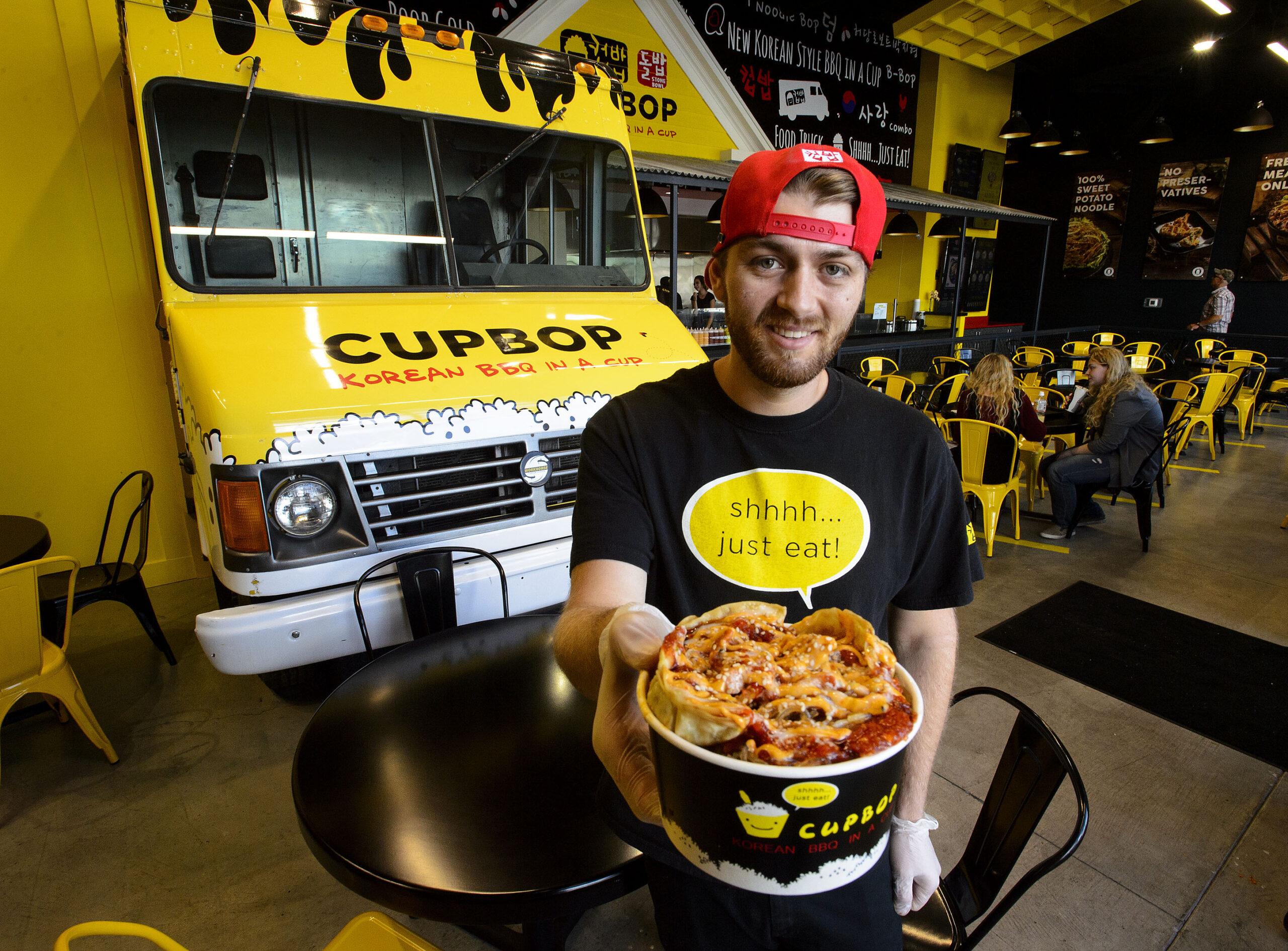Shark Tank Alum Cupbop Looks to National Stage
The Korean-inspired fast casual has nearly 50 locations in the U.S. and is earning around $1.1 million in AUV.
Among the country’s top 50 quick-service chains, Panda Express stands out as the only Asian concept. Dok Kwon believes there’s room for more, and he wants Cupbop to be next. The emerging brand is on a mission to be the first Korean-inspired fast-casual chain to go national.
Kwon joined the Korean barbecue concept as a co-owner and chief operating officer in 2020, after working as an investment banker and hedge fund manager in New York City. He’d spent the better part of a decade on Wall Street and was “itching for something new.” As he was plotting his next move, he remembered Cupbop, a food truck he frequented while living in Salt Lake City.
Founders: Junghun Song
Headquarters: Salt Lake City, Utah
Year Started: 2013
Annual Sales: ~$40 million (systemwide)
Total Units: 47 (US only)
Franchised Units: 19 (U.S. only)
When fellow Korean immigrant Jung Song first started serving up Korean barbecue under the Cupbop banner in 2013, Kwon was one of the earliest fans.
“One thing I knew right off the bat, before I even joined, was that the brand is naturally very scalable,” Kwon says. “That has to do with the fact that it started with a food truck, where you can run in very small spaces with only a few people, and where the operations have to be extremely simple.”
Kwon gave Song a call and pitched himself as a partner. He says it was evident the demand for the brand was there, but Cupbop was struggling to “take things to the next level.” It had grown to 10 locations while he was in New York, but he knew he could help it expand further. So, he left the finance world, purchased equity in the company, and got to work developing a strategy that would enable the business to scale efficiently.
Early on, Kwon decided to pivot from food trucks and channel all of the company’s resources toward brick-and-mortar restaurants. He says Cupbop had to dial back on growth to position itself for future success. That meant foregoing aggressive development goals to focus on the fundamentals.
“My priority is never store count,” Kwon says. “What really makes a brand special is the inherent demand you can generate, and that comes down to AUVs, margin profiles, and same-store sales.”
He isn’t the only former fan that’s helping Cupbop grow its footprint. Not long after Song opened his food truck, he met a pair of Indonesian students studying at the University of Utah. They struck up a partnership, and the company now has more than 150 locations throughout the Southeast Asian country.
Stateside, the company has taken a measured approach to growth. It hasn’t raised any money and has grown through organic cash flow, building one store at a time. When Kwon joined, Cupbop had a sole franchisee that had been grandfathered in since 2017. Despite a steady stream of inquiries from outside operators, he resisted opening the brand up for additional franchising opportunities.
“One thing I learned as an investor is that a lot of great companies fail when they start growing for growth’s sake,” Kwon says. “We probably could have opened up for franchising three years ago, but we said, ‘No, we’re not going to open it up until we’re ready, until we have the numbers and we’re confident with how stores are performing.’”
That strategy paid off when the company appeared on “Shark Tank” last spring. Kwon says it was the numbers, along with a taste of spicy Korean barbecue beef, that sparked interest from the potential investors. While all five sharks made offers, the brand ultimately struck a deal with Mark Cuban, taking a $1 million loan in exchange for a 5 percent stake in the business.
“I knew exactly what investors want and what’s important to them because I’d been sitting in their chair as an investor before joining Cupbop,” Kwon says. “Numbers talk, and the fact that we were able to accomplish everything through organic cash flow really got them interested.”
The business has only accelerated since then. AUVs are clocking in around $1.1 million, and same-store sales are consistently growing in the double-digits. Margin profiles are strong, too.
“We generally target about 25 percent on the bottom line at the store level, and we’ve managed to achieve that metric over the past year,” Kwon says. “Stores that do over $1.5 million in revenue tend to have margins that are right around or above 30 percent.”
Those numbers are giving him confidence in the brand’s ability to accelerate its national expansion through franchise growth. Cupbop late last year announced it was opening up for franchise opportunities. Now, it is seeking experienced multi-unit operators with a portfolio of restaurants to help it grow across the country.
The footprint stands at 47 stores throughout Utah, Idaho, Arizona, Colorado, Nevada, and Oklahoma.
“We’re focused on growing in the middle of the country and in the South,” Kwon says. “Then, we’ll start expanding out from there.”
Cupbop has stayed true to its food truck roots with small storefronts and simple operational procedures, offering a streamlined business model that Kwon believes will help attract the right partners.
He says the front-of-house setup is similar to Chipotle. Each cup starts with rice, cabbage, and noodles. Guests choose their protein and pick from a variety of sauces, with heat levels ranging from 1-10.
“We’ve been working to eliminate as many variables as possible on the back end,” Kwon says. “Now, all of our protein comes pre-marinated, so all you have to do is put it in a pot and cook it. That change happened as we started to really get ready for franchising.”
Kwon expects competition will heat up as Cupbop charts its national expansion, but several overlapping tailwinds will help the brand achieve its goal of bringing Korean cuisine to the masses.
“There is an outsized secular growth happening for Asian concepts,” he says. “Stacked on top of that, everything Korean is cool right now. From K-pop, to K-dramas, to “Squid Game” on Netflix, people are very interested in Korean culture, and with that, demand for Korean cuisine is growing. I think as we branch out into more states, we’re going to feel that even more.”






